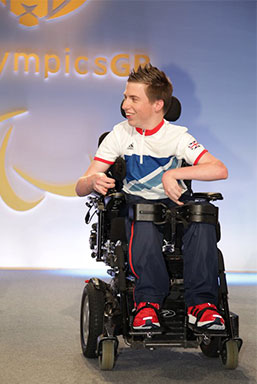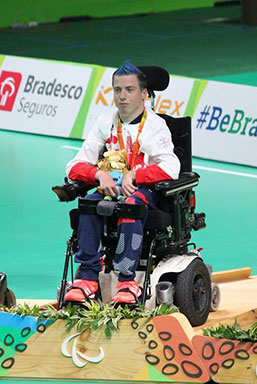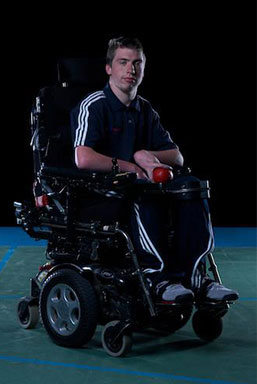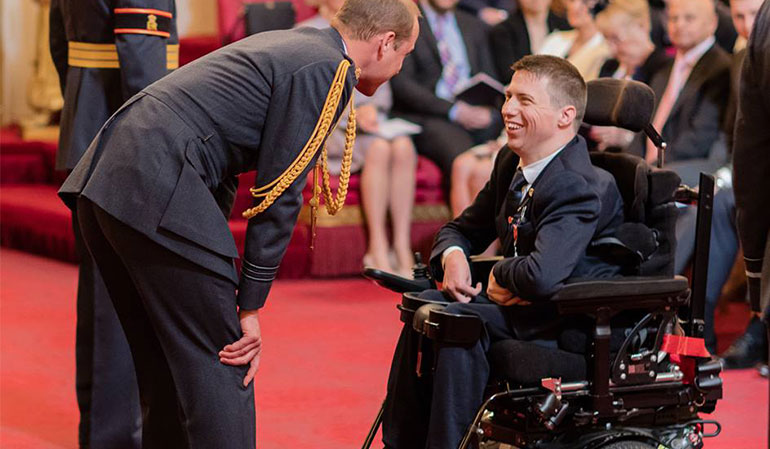Share:
Take it offline!
This Education in Motion resource is also available as a printable PDF.
Download PDF
Did you know that Boccia is currently the fastest growing Paralympic sport by participation? Originally adapted in 1964 it made its Paralympic debut in New York in 1984. I started playing when I was six-years-old, thanks to multiple opportunities through the special primary and secondary schools which I attended.
My career highlights so far are the three most recent Paralympic Games and the medals and titles I have achieved in the process. I feel incredibly lucky to have had so many experiences through Boccia and high-performance sport.

Boccia is probably the most accessible game in the world and the only one where able-bodied people can easily play alongside those with disabilities. The rules for Boccia are quite simple in principle, although more complexity is added when you compete at higher levels.
How is Boccia played?
The game can be played by individuals, pairs or teams of three and all events are mixed gender. The aim of the game is to throw leather balls as close as possible to a white target ball, or jack. The balls are coloured red or blue and the decision as to who plays which colour is decided by a coin toss.
The balls themselves are very easy to purchase and are a good size to grip. They can be moved, or  propelled with hands, feet or head, and if the player’s disability is so severe that it is impossible to propel the ball the required distances consistently, the player can be assisted with a device called a ramp.
propelled with hands, feet or head, and if the player’s disability is so severe that it is impossible to propel the ball the required distances consistently, the player can be assisted with a device called a ramp.
During the game, the jack is thrown first, then the first ball is played by the player who threw the jack. The opposing side plays next and after which, the side who is furthest away from the jack always plays.
Balls can be used to either stop close to the jack, or knock the balls already on the court into more favourable positions. In this fashion, each end will continue until one side has played all their balls. At this point the opposing side will play their remaining balls.
At the end of each round, or ‘end’, the referee measures the distance of the balls closest to the jack and awards points accordingly – one point for each ball that is closer to the jack than the opponents closest ball.

The team/player with the highest number of points at the end of play is the winner. If both teams have the same number of points after all ends have been played, one additional ‘tie break’ end is played on the mid-court cross to determine a winner.
The number of ends in a match depends on the make-up of the sides. In individual competitions the end will consist of four ends, with six balls per player per end, whilst paired competition is four ends and six balls per pair per end (three per player). Team competition is six ends and six balls per team per end (two per player).
 What does the Boccia court look like?
What does the Boccia court look like?
Competition Boccia is played on a court that measures 12.5 x 6 metres with 2 metres of empty space surrounding it. The surface of the court is flat and smooth. The throwing area is divided into six rectangular throwing boxes which the athletes must stay completely within during play. The court features a V-shaped line over which the jack must cross for the throw to be valid. A cross marks the position where the jack must be placed, if it is pushed onto, or crosses the boundary line during an end, or in the case of a tie-break.
For amateur games a Badminton Court can provide a good alternative as the dimensions are similar. In fact, the game is perfectly adaptable to all spaces and even works well as a garden game.
How can you start playing Boccia?
People can play at home, at school, college or university, or at a local Boccia club. There are a wide range of clubs, especially in England and Scotland. Check out the websites of Boccia UK, Scottish Disability Sport, Disability Sport Wales and Disability Sport Northern Ireland and search for ‘Boccia’ for more details. Some education centres have Boccia as part of their sports provision. When I find one that doesn’t I contact their PE department and encourage them to try it!
How do I play Boccia?
When training, I break the game up into key shot types. Repetition is crucial for success, as is trial and  error. I play an aggressive style and enjoy both the power and finesse sides of the game. Because I can place balls where I want and then remove them it feels very rewarding. However, reaching that level has taken years of practice.
error. I play an aggressive style and enjoy both the power and finesse sides of the game. Because I can place balls where I want and then remove them it feels very rewarding. However, reaching that level has taken years of practice.
The great thing about Boccia is that it requires minimal wheelchair adaptations to play. I have a specially designed electric wheelchair built entirely to make it easier for me to throw so I can be the best Boccia player in the world. However, I seemed to cope well in my Quickie Groove everyday chair and even picked up Paralympic silver and bronze when using this chair in 2012.
Boccia World Championships 2018
This year the Boccia World Championships are to be held in Liverpool and everyone at Boccia UK is very excited. Our international governing body, BISfed has decided to try to replicate the amazing atmosphere from London 2012 by organising the first ever ticketed Boccia competition.
Myself and Stephen McGuire as defending Paralympic and World Champions from 2016 will be part of the UK squad along with a European champion and multiple European medallists. As a sport, Boccia has sold out in London 2012 and Rio 2016 and we hope to do it again in Liverpool 2018. You can book tickets for the event by visiting the Bisfed 2018 World Boccia Championships website.

About the author
David Smith (or ‘Smithy’) is a professional Boccia player who lives in Swansea. David has Hypertonic Cerebral Palsy Quadriplegia and his day-to-day wheelchair is the Quickie Jive M powered wheelchair.
His Boccia career began at Treloar School where he moved for his secondary education. At the age of 14 David became the youngest ever British Boccia Champion, going on to become the Boccia World Champion at 18.
Since then he has represented Great Britain in the Paralympics on numerous occasions, where he has won two gold medals (Beijing 2008 and Rio 2016) and a silver and a bronze medal at London 2012. David holds a degree in Aerospace Engineering. He currently trains 6 days a week as a full-time athlete and is the reigning Boccia Paralympic Champion and World number one.
His greatest achievement is being the joint most successful British Boccia player in history with four Paralympic medals from three games and his proudest moment has been receiving his MBE from Prince William.